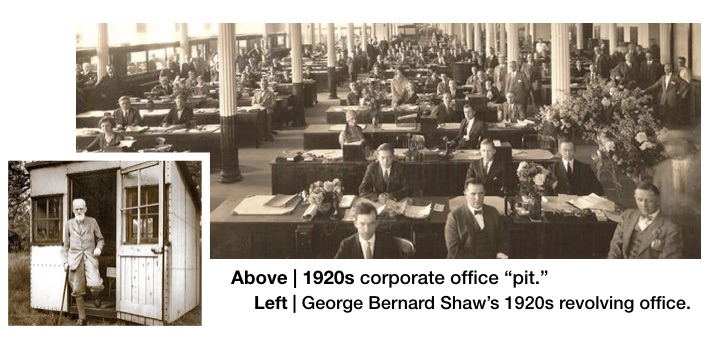Writing recently in the Harvard Business Review, Carlo Ratti and Matthew Claude asked (and attempted to answer) the question we are often asked (and sometimes ask, ourselves): If Work Is Digital, Why Do We Still Go to the Office? In the past, we’ve featured an interview with a former business owner about his experience working at one of the most radical “no office” businesses around, Automattic, the software company behind WordPress. We’re also a fan of co-working spaces and their benefit beyond merely providing a desk to work.
Our go-to expert on issues like this is Steve King of Emergent Research and a regular SmallBusiness.com contributor. In this post, Steve provides insight into a phenomenon Emergent has been tracking for several years: the paradox of place — While the internet and connective technologies have made working remotely easier than ever, people and companies are increasingly clustering together in fewer, more valuable locations.
Place and location have become both more and less important
Place is less important | Today’s rapidly improving connective technologies allow people to communicate with anyone, anywhere. This is why telecommuting is growing (although not as fast as many predicted) and work foCrces have become more distributed and mobile work much more common.
Place is more important | People and companies realize physical co-location leads to more interaction and innovation. Communities of innovation feed off one-another. Success in one field breeds success and infrastructure companies develop. Hollywood, Silicon Valley, Nashville — some places evoke an industry, not just a geographic location. If you work in certain industries, these places are going to be important to you, no matter where you may be, physically
In their HBR article, Carlo Ratti and Matthew Claude explore the paradox of place from the point of view of the office. Key quote on why we still cluster in offices:
What early digital commentators missed is that even if we can work from anywhere, that does not mean we want to. We strive for places that allow us to share knowledge, to generate ideas, and to pool talents and perspectives. Human aggregation, friction, and the interaction of our minds are vital aspects of work, especially in the creative industries.
This is also why coworking spaces are so successful and growing so rapidly. They are places where people aggregate, share knowledge and pool talents. They’re social places also, which is so important, it increases the likelihood members will be happier and more successful.
Humans are by nature social creatures. Because of this, we will continue to cluster. This means place will continue to be important even while technology makes it less important.
The paradox of place is not going away anytime soon and because of this, small businesses will still have offices, and for even the single-employee small business, the coworking industry will continue to grow.

